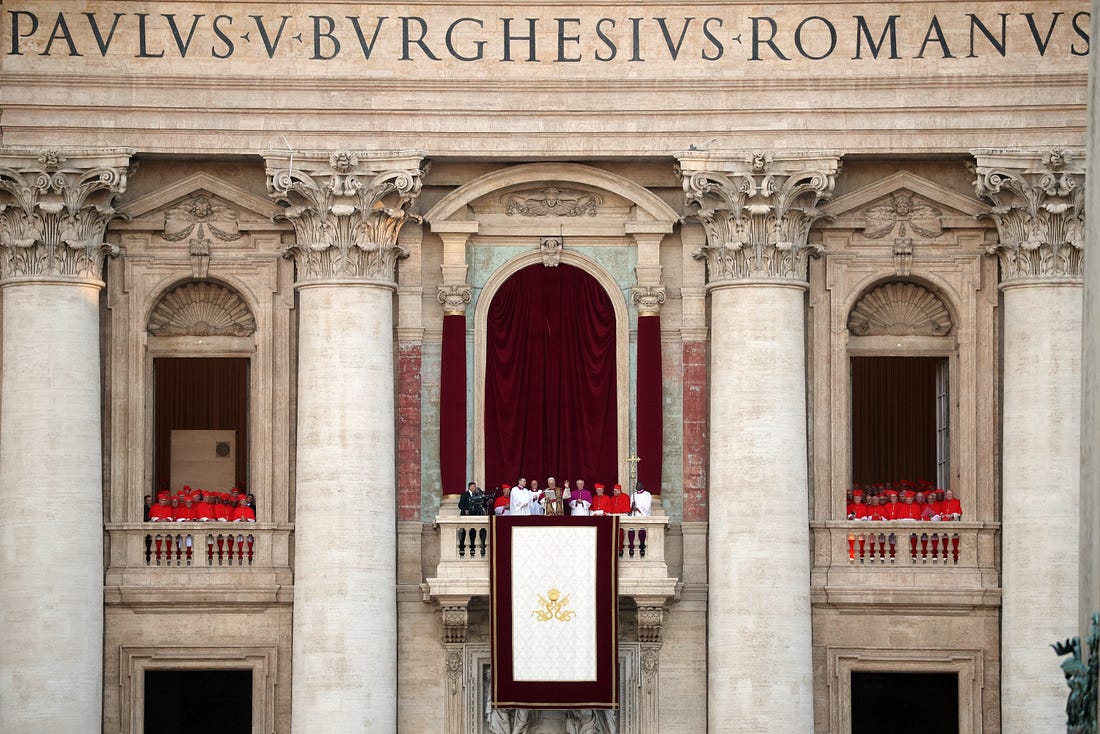|
 |
An American Pope and the Turn of the Tide
Fifty years ago, a Polish pope helped defeat communism. What will Bobby from Chicago do today?
So, look: Your Morning Shots correspondents aren’t highly acclaimed Vatican watchers. But what’s this we’re hearing about the new American pope, Leo XIV? He voted in Republican primaries in Illinois in 2012, 2014, and 2016—but seems to have departed the Republican fold since. Recently he’s been a resolute antagonist of Vice President JD Vance.
Hey, on the off chance he’s a subscriber: Your Holiness, we wish you all the best. And please say a prayer for Andrew to more regularly meet his filing deadline. Happy Friday.
An American in Rome
by William Kristol
I’m certainly not qualified to offer anything in the way of deep analysis about the selection of Cardinal Robert Prevost as the 267th occupant of the throne of St. Peter.
But I will say that it never occurred to me that I’d one day see a fellow citizen of the United States as pope.
And not just any old American—but a baseball fan! The photos of him attending a 2005 Chicago White Sox World Series game suggest he was enjoying himself.
Permit me a brief digression: Karl Barth, the formidable twentieth-century Protestant theologian, was a great lover of the music of Mozart. He’s famously reported to have remarked that when the angels play music for God, they play Bach—but when they play for themselves, en famille, they play Mozart. In that spirit, I’d like to think that when the angels have a leisurely afternoon in heaven to themselves, they watch baseball. Perhaps Pope Leo XIV would agree?
In any case, yesterday’s election brought back memories for me of the election in October 1978 of Poland’s Cardinal Karol Józef Wojtyła—the first time a non-Italian had been selected as pope in over four centuries.
I didn’t know a great deal then about Wojtyła, and didn’t have the time to learn much, as I was in my first semester teaching at the University of Pennsylvania and was desperately scrambling to stay one class ahead of the students (to say nothing of finishing my dissertation).
But I do remember this: I and my fellow Cold-War-liberals-en-route-to-becoming-Reagan-Republicans found the selection of this anti-Communist and pro-freedom pope from behind the Iron Curtain exciting. It gave us hope in dark times. The 1970s had been a tough decade for the United States at home and for the forces of freedom in the world. There was a sense of the West in decline. Could this trend be reversed?
It was reversed, partly thanks to the new pope. In June 1979, John Paul II made his extraordinary trip to Poland. The Solidarity movement emerged soon after. Meanwhile, Margaret Thatcher became prime minister of Great Britain in May 1979, and Ronald Reagan was elected in November 1980. The decade of the 1980s turned out to be very different from that of the 1970s. In 1989, the Berlin Wall fell.
History doesn’t repeat itself. But perhaps it rhymes. Could Pope Leo XIV foretell a similar revival of the forces of freedom today, as Pope John Paul II did almost half a century ago? (JVL writes on the pope and American politics in his latest Triad, with some clues about the direction Leo XIV might want to take his papacy.)
Cardinal Wojtyła had been a great opponent of the Communist dictatorship that ruled over his native land. As pope, he saw Poland liberated from it. Cardinal Prevost has been a critic of the nativist bigotry and cruelty now ascendant in the United States. Could his selection help spark an increased revulsion against that bigotry and cruelty, and even herald a liberation from it?
Why not?
After all, as William Cowper’s great hymn reminds us:
God moves in a mysterious way His wonders to perform;
He plants His footsteps in the sea, and rides upon the storm.
Where Does Christine O’Donnell Go To Get Her Apology?
by Andrew Egger
One of these days, Donald Trump’s newfound tendency for supervision-free delegation is going to come back to bite him. Maybe it already is.
Here was the president yesterday, explaining his decision this week to nominate “wellness” influencer Casey Means as the next surgeon general: “Bobby [RFK Jr.] thought she was fantastic. . . . I don’t know her. I listened to the recommendation of Bobby.” The single biographical fact Trump had to offer on Means—that she had graduated top of her class from Stanford—was incorrect.¹
In other words, there’s good reason to believe that Trump didn’t quite know the can of worms he was opening by picking Means. And what a can it is!
As an influencer, her expressed views run a wide gamut: from cheerfully wholesome (people should get more sunlight, sleep, and unprocessed food) to kookily crunchy (the importance of “composting” human bodies) to darkly conspiratorial (she has cast doubts on the safety of vaccines and flirted with chemtrail conspiracies). And that’s not to mention her unique dash of—how even to describe it—neopaganism?
Peruse her newsletter writeup of the things she did to “tap into the ‘mystical’ side of evolving my consciousness” while trying to “find love at age 35” and affix your own label:
I set up a small meditation shrine in my house and prayed to photos of my ancestors asking for support on my personal journey, and wrote mantras and manifestations on small pieces of paper and tucked them around the shrine. . . .
I worked with a spiritual medium who helped me try to connect with my spirit guides for support and guidance. I did full moon ceremonies with grounded, powerful women . . .
I hiked alone and talked (literally out loud) to the trees, letting them know I was ready for partnership, and asking them if they could help. . .
I did plant medicine experiences with tr
